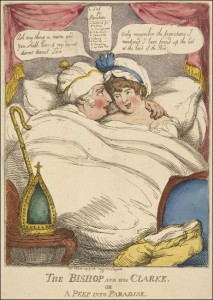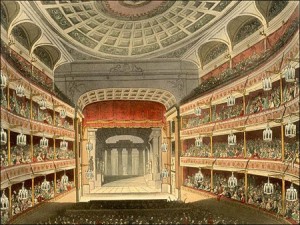All links are to Wikipedia entries.

The Bishop and His Clarke or a Peep Into Paradise by Thomas Rowlandson, 1809.
The Duke of York (who also held the title Bishop of Osnabrück) is lampooned for succumbing to the demands of his mistress, Mary Anne Clarke. He says: “Ask anything in reason and you shall have it my dearest dearest dearest love.” She says: “Only remember the promotions I mentioned. I have pinned up the list at the head of the bed.”
Government, Politics, and War:
- January 5: The Treaty of the Dardanelles is signed between Britain and the Ottoman Empire, affirming that no warship of any nation may enter the Straits of the Dardanelles and the Bosphorus. The treaty is aimed implicitly against Russia, whose Black Sea fleet poses a threat to Britain in the Mediterranean, and it pledges British support for Constantinople in the event of a French declaration of war against the Turks.
- January 16: Sir John Moore’s demoralized forces stagger into Corunna, face attack from Marshall Soult’s troops, and are finally bundled onto transports back to England. Moore is killed in the battle. The failed campaign is a major political embarrassment to the British government.
- February 8: Austria declares war on France.
- February 20: The Second Siege of Saragossa comes to an end when the Spanish finally surrender to French forces after what is considered one of the most brutal battles of the Napoleonic wars. Most of the city lay in ruins, and 54,000 people had perished in the siege.
- March 4: James Madison becomes fourth President of the United States.
- March 25: The Duke of York resigns as Commander-in-Chief of the British Army when his mistress, Mary Anne Clarke, is accused of illegally selling army commissions under his aegis.
- March 29: Soult captures Porto.
- April 22: Arthur Wellesley returns to Portugal to command the Anglo-Portuguese forces.
- April14: Napoleon defeats the Austrians in the Battle of Abensberg, Bavaria and again at the Battle of Eckmühl.
- May 11: An Anglo-Portuguese Army commanded by Wellesley defeats the French army commanded by Marshal Soult at the Battle of Grijó.
- May 12: Wellesley drives Soult out of Porto in one of the most brilliant operations of his military career.
- May 17: Napoleon orders the annexation of the Papal States to the French empire and announces the Pope’s secular power has ended. Pope Pius VII is imprisoned after he excommunicates the emperor.
- May 24: Dartmoor Prison opens in England to hold French prisoners of war.
- July 6: Napoleon defeats the Austrian army at the Battle of Wagram.
- July 28: Wellesley advances into Spain, joining forces with the Spanish army, under the command of General Gregorio de la Cuesta, at the Battle of Talavera. It is a decisive victory over the French, led by Joseph Bonaparte, and makes a hero of Wellesley at home.
- July 30: 40,000 British troops commanded by John Pitt, 2nd Earl of Chatham, attempt an unsuccessful expedition to the Netherlands in the expensive Walcheren Campaign, intending to open up a second British front against France in mainland Europe to aid Austria. Little fighting occurs, and most of the 4000 British casualties are lost to fever (known as “Walcheren Fever”).
- September 4: Wellesley is appointed Baron Douro and Viscount Wellington.
- October 4: Spencer Perceval becomes Britain’s Prime Minister after the death of the Duke of Portland.
Society and Social History:
- England’s Two Thousand Guineas race has its first running at Newmarket.
- Jenny Pipes of Leominster becomes the last woman in England to suffer punishment in the ducking stool for being a common scold.
- June 8: Thomas Paine, pamphleteer, revolutionary, and author of Rights of Man, dies at age 72.
Literature, Journalism, and Publishing:
- Charles Lamb and Mary Lamb publish Poetry for Children.
- January 1: Ackermann’s Repository of Arts begins publication.
- March 1: The Quarterly Review begins publication.
- June 1: Samuel Taylor Coleridge founds The Friend, a periodical which ran for 25 issues.
Music:
- May 31: Composer Franz Joseph Hadyn dies at age 77.
Theater and Dramatic Arts:
- February 24: The Theatre Royal, Drury Lane burns down.
- September 18: A new Royal Theatre at Covent Garden opens in London to replace the one destroyed by fire in 1808. Ticket price increases lead to the Old Price Riots which last for 64 days.
Science and Industry:
- February 11: Robert Fulton patents the steamboat.
- August 18: Engineer and manufacturer Matthew Boulton dies at age 80.





